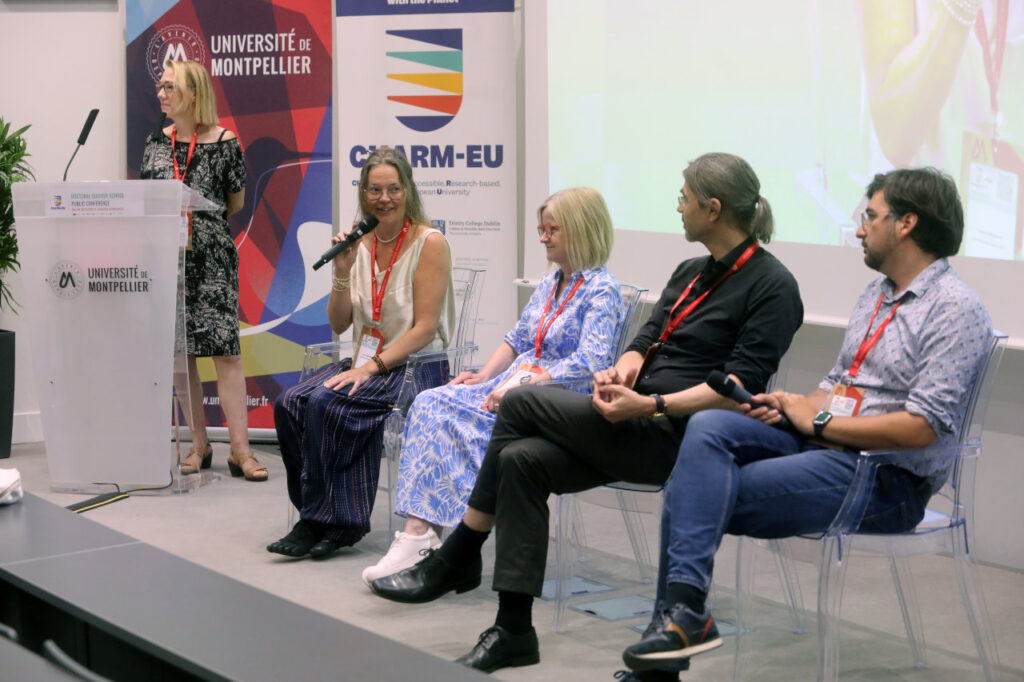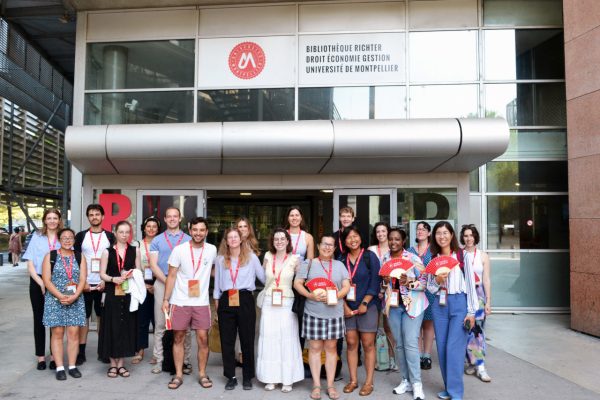On June 23, twenty-six doctoral students from diverse academic backgrounds—psychology, education, ecology, art, health, sociology, IT, and more—arrived in Montpellier to take part in this pioneering initiative. Representing the nine prestigious institutions of the CHARM-EU alliance, they came together to explore new ways of thinking and work across disciplinary boundaries. The workshops were carefully designed by the alliance’s Knowledge Creation Teams (KCTs), multidisciplinary groups composed of faculty members, researchers, and educational engineers.
The central theme of the summer school was “Developing Transdisciplinary Practice to Tackle Complex Challenges.” Over the course of the week, participants collaborated on the development of transdisciplinary research projects under the guidance of experienced scholars. Embracing a transdisciplinary approach is increasingly recognized as a key competency for the next generation of researchers. It enables them to contextualize their work and articulate the real-world impact of their findings—an essential skill in a landscape where many funding calls now prioritize collaborative, cross-disciplinary, and international partnerships.
A Landmark International Conference
June 24 marked a highlight of the week: the first major CHARM-EU conference, bringing together nine experts from nine European universities to explore nine distinct research themes. Titled “Connecting Knowledge, Shaping Futures: Transdisciplinarity in Research,” the event offered a rich and inspiring overview of transdisciplinary projects across the alliance. The invited speakers—leading researchers in fields ranging from philosophy and law to physics, hydrogeology, epidemiology, and medicine—shared a commitment to excellence and a vision for a more sustainable society.
Among them was Mircea Sofonea, Associate Professor of Epidemiology and Infectious Disease Evolution at the University of Montpellier, who also teaches in the international CHARM-EU Masters program. His presentation “Interdisciplinarity is key in health crisis management: insights from Montpellier’s research for pandemic surveillance and control” addressed the gaps between disciplines and professional sectors in healthcare, and their implications for decision-making. He also spoke on behalf of the ExposUM Institute, where he leads interdisciplinary health-environment research initiatives supported by the University of Montpellier and its partners. The conference underscored how transdisciplinarity can drive innovation in research—offering a powerful source of inspiration for the future.

Empowering the Next Generation of European Researchers
Following the conference, doctoral researchers worked intensively in small groups to develop research proposals. They also took time to explore the city through a geolocated digital tour and enjoyed a playful introduction to French gastronomy.
On the final day, participants presented their projects to a jury composed of KCT members. Their work addressed pressing contemporary issues such as international collaboration, global health, food systems, urbanization, artificial intelligence, and research infrastructures. The jury praised the high quality of the work, the students’ eagerness to learn and collaborate across disciplines, and their strong commitment to making a meaningful impact on society. The team focusing on climate change was awarded top honors, but all participants emerged as winners—demonstrating that the next generation of European researchers is ready to meet future challenges with confidence and creativity.
Laying the Groundwork for Future Collaboration
This first edition in Montpellier was a resounding success. According to Gilles Subra, CHARM-EU project director at the University of Montpellier, the event “laid the foundations for future collaborative research projects within the alliance,” particularly those involving early-career researchers. Planning is already underway for the next edition, which will be hosted in 2026 by Åbo Akademi University in Finland. Together, we are paving the way for a new generation of European research.
Watch the Conference Replay:
CHARM-EU: An Alliance at the Crossroads of Disciplines
In his opening speech, University of Montpellier President Philippe Augé emphasized the critical importance of transdisciplinarity across higher education institutions. He also highlighted its central role in the Master’s in “Global Challenges for Sustainability” a joint initiative of the nine Charm-EU partner universities. This innovative curriculum is built around real-world problem-solving and welcomes students from all academic backgrounds. President Augé reaffirmed that universities were built on two pillars: education and research. Several projects within the alliance already integrate transdisciplinary research, including a shared elective module launched in 2024 by the University of Montpellier and Utrecht University focusing on tackling health challenges in internationally linked research hubs. The second edition of this shared module begins in September 2025, expanding to include the University of Barcelona. Together with researchers and patients, they will address the challenges of immunotherapy in cancer treatment—another step forward in advancing transdisciplinary research across Europe.
This article was originally published on the website of the University of Montpellier.

